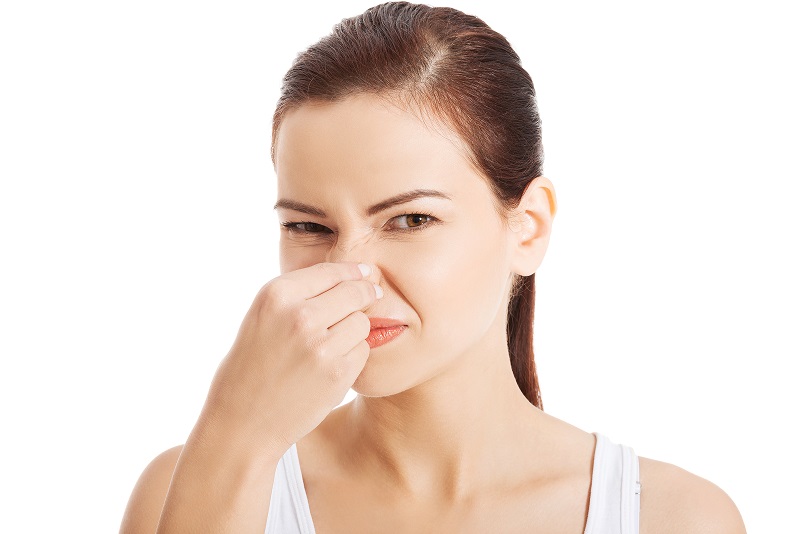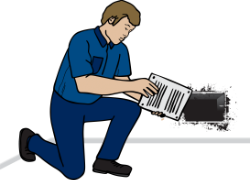Why Do My Air Ducts Smell Musty?

Our air duct cleaning team hears this complaint quite often from new customers:
“Every time I turn on the air conditioner in the summer, the vents stink with a nasty, musty odor. What gives?”
Here’s what gives. Unfortunately, the source of the noxious odors is probably mildew and/or mold, neither of which is good for the operating efficiency of your HVAC system or the air quality in your home. Mold and mildew, if undetected and allowed to grow, can damage your air conditioner, furnace, or related components, and lead to significant health concerns – especially for people with allergies or compromised immune systems.
What is Mold?
Mold is a kind of fungus that contains small organisms found nearly everywhere, indoors or outdoors. They can be black, green, orange, purple, or white. Molds flourish in humidity and breed by means of minuscule, lightweight spores that journey through the air. You're exposed to it daily, but once the spores are released – especially indoors – they can be inhaled and pose health risks.
For those unaware, mildew is simply a kind of mold that can grow on any organic matter where there's sitting water or moisture.
Where Can I Find Mold or Mildew in My Home?
If you're wondering why your air ducts smell, look no further than mold or mildew. And what are the sources of these nasty, microscopic organisms?
- Moisture in attics and basements from damp walls or leaking roofs will get into loose joints or cracks in your ductwork. Over months or years, this can develop in mold growth in cold air return ducts. Plus, if insulation covering ducts in areas of your home that are not air-conditioned absorbs moisture, mold can flourish and the noxious odors can enter through even the tiniest cracks in ductwork.
- Dirty evaporator coil, which is the part responsible for cooling your home. This is a hotbed for mold, thanks to four key ingredients the coil provides: Collected organic material, darkness, moisture, and cozy temperatures. Excess moisture turns into mold on the coils, and the air passing over the coils spreads the mold spores throughout the ducts.
- The HVAC system’s condensate drain directs excess water away from the unit’s air handler to the outside. When the drain gets blocked, the surplus moisture enters the ducts and creates mold or mildew and a horrible musty smell.
- Clogged filters give moisture a free pass to settle in your return air ductwork, creating mold and mildew.
- Problems with fan speed. An incorrect fan speed may add moisture to the ductwork. If too much moisture settles in the ducts, mildew or mold will take shape, distributing a musty smell throughout your home.
Another potential source of mold is an oversized HVAC system, one that simply overpowers your home's heating and cooling needs. In this case, bigger isn't always better. If a company willingly sold you an oversized HVAC unit, shame on them. If the system is too large, it will potentially short cycle, where it blasts your residence with cold air and then shuts down very quickly and won’t remove moisture the way it should.
Why Do My Air Ducts Smell Musty?
Mold and mildew is the primary cause for air ducts which smell musty. Regularly cleaning ducts, wall grates, and replacing filters is a good way to avoid this problem. If you’re looking for other options, call us today with questions about indoor air quality products and other strategies to keep your ductwork smelling fresh all year.
Rid Your Air Ducts of Musty Odors
No one likes the smell of mold or mildew wafting through your home. Whether you live alone, have a family, or entertain guests, odors like these are a warning sign to anyone so stay away until the problem’s resolved. But how do clean air ducts of musty odors?
- Clean your malfunctioning air conditioner, particularly the dirty evaporator coil, clogged condensate drain line, or filthy air filter. An experienced DIY enthusiast should be able to handle any of these but replacing the air filter is normally pretty easy. In some cases, however, even our technicians have struggled mightily in the case of HVAC systems in finished basements where access to the air filter is partially blocked by walls or stairwells.
- Install duct filter pads in your vents to control the smell. These are exactly what they sound like. Small, vent-sized filters installed behind the wall grate to capture nasty odors.
- Apply other plentiful DIY odor-control methods, such as placing baking soda inside your air ducts.
Ultimately, the problem may be bigger than you think. It’s not unusual for a homeowner to call us and say they’ve tried every cleaning and DIY option under the sun, but their air ducts still smell musty. It’s a frustrating situation and we understand where you’re coming from. In this case, the best recommendation is to consider air duct sanitization and air duct cleaning services from Arvada specialists like ours, who are happy to do the work for you.
Choose an Air Duct Cleaning Service You Can Trust
Steve's Air Duct Cleaning is proud to have served residential and business clients from Arvada to Boulder and throughout the greater Denver metro area for more than 40 years. Our technicians are highly trained and experienced, using truck-mounted power vacuuming systems for typical cleaning requirements, and an advanced air ram system for jobs that require even deeper cleaning. Call us today at 720-419-7792 for more information or book an appointment online.
Start Breathing Easier.
Your air ducts are the lungs of your home and keeping them clean keeps you and your family healthier and your HVAC equipment working optimally.


